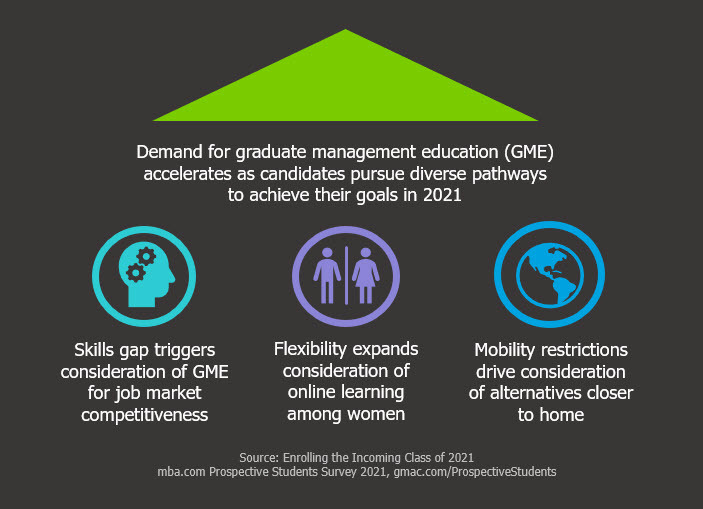A new GMAC research report based on the data collected through mba.com Prospective Students Survey provides insights into the diverse choices and preferences of prospective students planning to pursue graduate management education (GME) in 2021. The findings suggest that demand for GME continues to accelerate as the concerns about the impact of COVID-19 wane. The report identifies at least three notable growth drivers for GME related to employability, flexibility, and regional mobility.

When considering and applying for graduate business programs, a candidate’s journey involves a complex interplay of individual, school, and destination characteristics. The COVID-19 pandemic has reset these characteristics, resulting in a new set of choices for candidates. At GMAC, we have been tracking candidate journeys in the context of COVID-19 uncertainties.
An analysis based on the data collected in March 2020 concluded that “The uncertainty and crisis caused by the COVID-19 global pandemic will influence the choices and expectations of graduate management education (GME) candidates. At the same time, prospective candidates are not giving up on their aspirations.” In November 2020, the Application Trends Survey of over 1,000 graduate management programs worldwide confirmed that the 2020 enrollment funnel was reconfigured as schools and candidates had to make decisions with imperfect information.
Looking ahead at the journey of prospective students planning to enroll in 2021, a new GMAC research report based on the data collected through the mba.com Prospective Students Survey shows that the level of concern about the impact of COVID-19 has been declining over time. The proportion of respondents reporting that they are extremely concerned or very concerned declined from 41 percent in July to 33 percent in December. While there are variations in the levels of concern, most respondents continue to exhibit strong confidence in the value of a graduate business degree. Overall, four in five (84%) candidates strongly agreed or agreed that a graduate business degree helps them stand out at work.
The top of the enrollment funnel for GME programs in 2021 continues to gain interest from prospective students. They are signaling a willingness to explore different paths for pursuing GME. This report identifies at least three notable growth drivers for GME related to flexibility, employability, and regional mobility.

Women are embracing online learning at a higher level than men
Despite the more severe impact of the pandemic on women, many female candidates recognize the need to invest in GME for career advantage. They are more likely to value the flexibility of online learning. Nearly 60 percent of female candidates planning to pursue an MBA in their country of citizenship (domestic) are willing to complete more than 30 percent of their program online due to COVID-19 compared to 52 percent of male candidates.
Domestic business master’s candidates are most likely to report a skills gap
The journey for pursuing a graduate business degree begins early and is shaped over time. However, the pandemic has expanded the pool of candidates considering GME as they discovered a skills gap in their job search process. Half of the candidates planning to pursue a business master’s degree in their country of citizenship (domestic) reported that they “wanted to apply for a job but lacked required skills and/or degree to be competitive.”
International candidates still prefer mobility over online
Overall, international candidates (70%) are more likely to report that they are not changing their original plans than domestic candidates (52%). This data suggests that most international candidates continue to value mobility. They would opt for an in-person experience closer to home instead of substituting it with online learning. Nearly 18 percent of international candidates are willing to consider a business school closer to home—compared with14 percent willing to consider online learning.
Conclusion
The global pandemic is accelerating the demand for GME in 2021 as candidates adapt their journeys and consider alternatives in line with their career goals. The new GMAC research report—Enrolling the Incoming Class of 2021—provides a forward-looking view of the shape of the things to come for graduate enrollment at business schools in 2021. It reaffirms the importance of monitoring and tracking diverse candidate journeys to inform future enrollment strategies.
---
Related posts
Women in Graduate Management Education
New Directions for Business Master’s Programs
The Future of Full-time MBA Programs
About the Survey
The findings summarized in this blog are based on the report entitled “Enrolling the Incoming Class of 2021: Insights into the diverse journeys of prospective students applying to business schools.” The data was collected through the mba.com Prospective Students Survey between July and December 2020 from a total of 2,515 individuals worldwide. These respondents indicated plans to enroll in a GME program in 2021. International candidates are defined by their preference to study in a destination outside their country of citizenship. For example, a US citizen preferring to pursue an MBA program in Spain would be categorized as an international candidate. The report examines how candidate journeys vary by the preference for program type and study destination. It summarizes findings by program types (Full-Time MBA, Executive MBA, Online MBA, Master of Data Analytics, Master of Finance, Master in Management, etc.), study destinations (Canada, France, US, UK, etc.), and candidate citizenship (China, India, Nigeria, US, UK, etc.). These findings reflect the users visiting mba.com and should be interpreted with caution in the rapidly evolving context of COVID-19.

